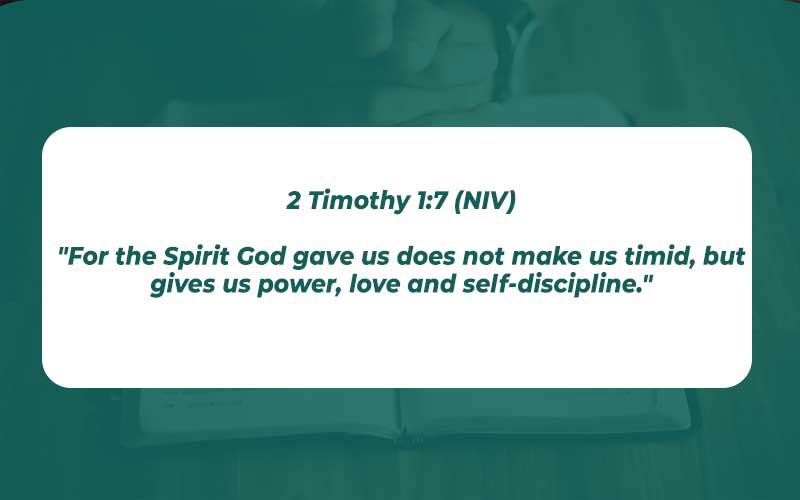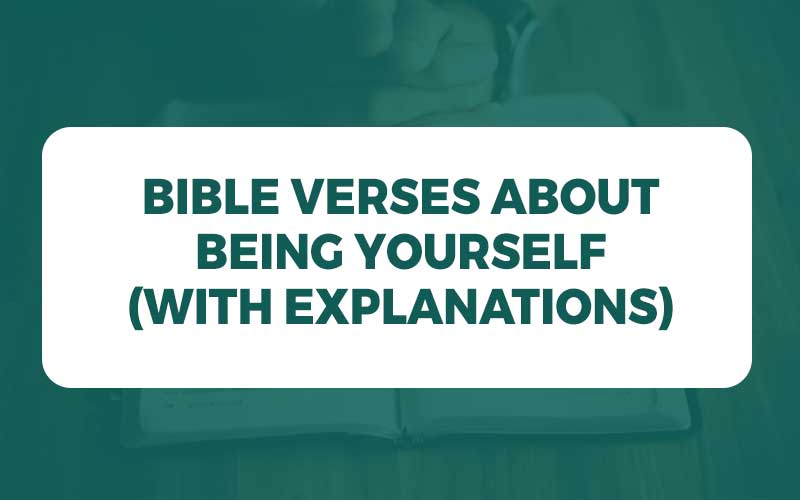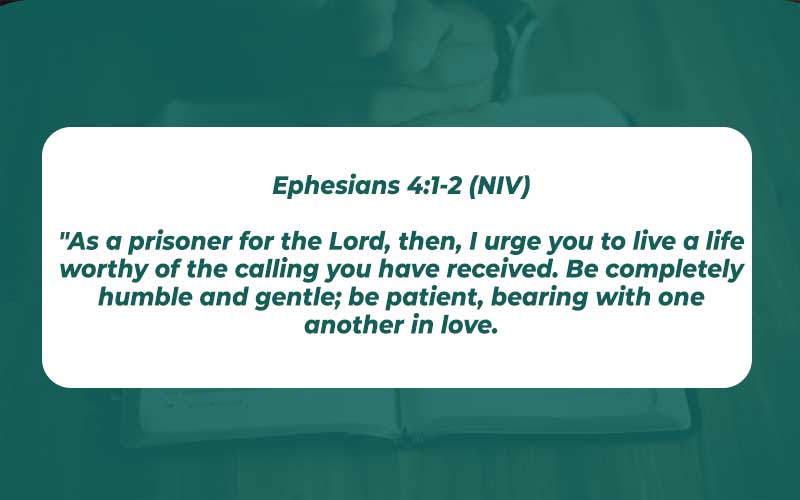The concept of “Being Yourself” encapsulates the essence of embracing one’s individuality, authenticity, and unique identity. It involves acknowledging and accepting one’s personality traits, strengths, weaknesses, beliefs, and values without pretense or conformity to external expectations.
This topic delves into the significance of authenticity, self-acceptance, and living in alignment with one’s genuine identity while navigating the challenges of societal pressures, self-doubt, and the quest for validation.
Embracing oneself involves finding confidence, contentment, and fulfillment in being true to who you are and celebrating the unique qualities that make you an individual in the eyes of God and in the world around you.
Also Read: Bible Verses About Bullying (with Explanation)
Bible Verses About Being Yourself
Psalm 139:14 (NIV)
“I praise you because I am fearfully and wonderfully made; your works are wonderful, I know that full well.”
Psalm 139:14 emphasizes the truth of being fearfully and wonderfully made by God. This verse celebrates the unique creation of each individual by the divine hand of God. It reminds us that we are intentionally and beautifully designed by God Himself.
Embracing oneself means acknowledging God’s intricate craftsmanship in forming us and understanding our inherent worth and value in His eyes. It encourages us to appreciate our distinct qualities, recognizing the beauty in our uniqueness.
Galatians 6:4-5 (NIV)
“Each one should test their own actions. Then they can take pride in themselves alone, without comparing themselves to someone else, for each one should carry their own load.”
Galatians 6:4-5 urges individuals to assess their actions and take pride in their own journey without comparing themselves to others. It emphasizes personal responsibility and self-awareness, encouraging individuals to focus on their unique paths and avoid the pitfalls of comparison.
Each person bears their own responsibilities and experiences, making comparisons redundant. Embracing oneself involves self-assessment and taking pride in personal growth and progress without being swayed by external benchmarks or standards.
Romans 12:2 (NIV)
“Do not conform to the pattern of this world, but be transformed by the renewing of your mind. Then you will be able to test and approve what God’s will is—his good, pleasing and perfect will.”
Romans 12:2 urges believers not to conform to societal pressures but to renew their minds according to God’s will. It highlights the importance of authenticity and resisting conformity to worldly norms that may contradict God’s intentions.
Embracing oneself involves aligning thoughts, actions, and beliefs with God’s truth, allowing for personal transformation guided by His will.
Ephesians 2:10 (NIV)
“For we are God’s handiwork, created in Christ Jesus to do good works, which God prepared in advance for us to do.”
Ephesians 2:10 underscores the concept of being God’s masterpiece, designed for specific purposes. It reinforces the idea that each person is uniquely crafted by God for His purposes.
Embracing oneself involves acknowledging one’s significance in God’s plan and discovering and fulfilling the good works He has prepared for each individual.
1 Peter 4:10 (NIV)
“Each of you should use whatever gift you have received to serve others, as faithful stewards of God’s grace in its various forms.”
1 Peter 4:10 emphasizes using one’s unique gifts to serve others. It encourages individuals to embrace their God-given talents and abilities for the betterment of others, reflecting God’s grace. Embracing oneself involves recognizing and utilizing one’s strengths and gifts to impact the world positively.
Matthew 5:14-16 (NIV)
“You are the light of the world. A town built on a hill cannot be hidden. Neither do people light a lamp and put it under a bowl. Instead, they put it on its stand, and it gives light to everyone in the house. In the same way, let your light shine before others, that they may see your good deeds and glorify your Father in heaven.”
Matthew 5:14-16 compares believers to light and encourages them to let their light shine before others. This metaphor signifies the importance of living authentically and allowing God’s goodness to radiate through our actions and character. Embracing oneself involves living genuinely and positively impacting the world, leading others to recognize God’s work within us.
1 Corinthians 12:12 (NIV)
“Just as a body, though one, has many parts, but all its many parts form one body, so it is with Christ.”
1 Corinthians 12:12 illustrates the diversity within the body of Christ, highlighting the significance of each individual. It emphasizes unity in diversity, acknowledging that while each person is unique, they all contribute to the unified purpose of the body. Embracing oneself involves recognizing one’s unique role and value within the community of believers.
Colossians 3:23-24 (NIV)
“Whatever you do, work at it with all your heart, as working for the Lord, not for human masters, since you know that you will receive an inheritance from the Lord as a reward. It is the Lord Christ you are serving.”
Colossians 3:23-24 encourages wholehearted dedication in all endeavors, focusing on serving God rather than pleasing people. It emphasizes doing one’s best in everything, acknowledging that our efforts ultimately serve the Lord. Embracing oneself involves performing tasks and pursuing passions sincerely, recognizing them as opportunities to honor God.
Psalm 25:4-5 (NIV)
“Show me your ways, Lord, teach me your paths. Guide me in your truth and teach me, for you are God my Savior, and my hope is in you all day long.”
Psalm 25:4-5 reflects a prayer for divine guidance and instruction. It acknowledges dependence on God for direction and understanding. Embracing oneself involves seeking God’s guidance to navigate life’s paths and make decisions, trusting in His wisdom and seeking to align with His will.
Romans 14:12 (NIV)
“So then, each of us will give an account of ourselves to God.”
Romans 14:12 emphasizes individual accountability before God. It underscores the responsibility of each person to live according to their convictions and principles. Embracing oneself involves owning personal beliefs and choices, recognizing that ultimately, every individual is accountable to God.2
Corinthians 10:12 (NIV)
“We do not dare to classify or compare ourselves with some who commend themselves. When they measure themselves by themselves and compare themselves with themselves, they are not wise.”
2 Corinthians 10:12 discourages self-comparison and highlights the folly in measuring oneself against others. The verse underscores the importance of avoiding self-evaluation based on external standards or comparisons with others. Embracing oneself involves understanding that our worth isn’t derived from comparison but in recognizing our unique identity in Christ.
Proverbs 3:5-6 (NIV)
“Trust in the Lord with all your heart and lean not on your own understanding; in all your ways submit to him, and he will make your paths straight.”
Proverbs 3:5-6 emphasizes the significance of trusting in God rather than relying solely on personal understanding. It encourages surrendering to God’s guidance and wisdom, acknowledging His sovereignty in directing our lives. Embracing oneself involves trusting God’s plan and relinquishing control, knowing that His direction is ultimately for our good.
Ephesians 4:1-2 (NIV)
“As a prisoner for the Lord, then, I urge you to live a life worthy of the calling you have received. Be completely humble and gentle; be patient, bearing with one another in love.”
Ephesians 4:1-2 urges believers to live in accordance with their calling, exhibiting humility, gentleness, patience, and love towards others. It emphasizes the importance of reflecting Christ’s character in our conduct. Embracing oneself involves aligning our actions with God’s calling, displaying humility and love towards others authentically.
Philippians 1:6 (NIV)
“Being confident of this, that he who began a good work in you will carry it on to completion until the day of Christ Jesus.”
Philippians 1:6 assures believers of God’s faithfulness in completing the transformative work He has started in them. It instills confidence that God continually works in believers’ lives, shaping and molding them into Christlikeness. Embracing oneself involves trusting God’s ongoing work of transformation and growth.
Psalm 37:4 (NIV)
“Take delight in the Lord, and he will give you the desires of your heart.”
Psalm 37:4 encourages finding joy and satisfaction in God, aligning one’s desires with His will. It implies that when our delight is in God, our desires are molded in accordance with His purposes. Embracing oneself involves finding contentment in God’s presence and allowing Him to shape our desires and aspirations.Psalm 139:17-18 (NIV)
“How precious to me are your thoughts, God! How vast is the sum of them! Were I to count them, they would outnumber the grains of sand—when I awake, I am still with you.”
Psalm 139:17-18 reflects on the value of God’s thoughts towards us. It emphasizes the incomprehensible nature of God’s care and attention to each individual. Embracing oneself involves recognizing the immense love and attention God has for every person, understanding one’s worth in His eyes.
Galatians 5:22-23 (NIV)
“But the fruit of the Spirit is love, joy, peace, forbearance, kindness, goodness, faithfulness, gentleness, and self-control. Against such things there is no law.”
Galatians 5:22-23 highlights the fruit of the Spirit, outlining the characteristics that God produces in the lives of believers. Embracing oneself involves allowing these attributes to manifest in one’s life, reflecting the work of the Holy Spirit and exemplifying Christ-like qualities.
1 Peter 3:3-4 (NIV)
“Your beauty should not come from outward adornment, such as elaborate hairstyles and the wearing of gold jewelry or fine clothes. Rather, it should be that of your inner self, the unfading beauty of a gentle and quiet spirit, which is of great worth in God’s sight.”
1 Peter 3:3-4 emphasizes the significance of inner beauty over external appearance. It underscores the value God places on the inward character, highlighting the beauty of a gentle and humble spirit. Embracing oneself involves focusing on nurturing inner virtues and character rather than external appearances.
1 John 3:1a (NIV)
“See what great love the Father has lavished on us, that we should be called children of God!”
1 John 3:1a emphasizes the depth of God’s love for His children. It signifies the incredible privilege of being identified as God’s beloved. Embracing oneself involves understanding the depth of God’s love, finding identity and security in being His cherished child.
Philippians 2:3-4 (NIV)
“Do nothing out of selfish ambition or vain conceit. Rather, in humility value others above yourselves, not looking to your own interests but each of you to the interests of the others.”
Philippians 2:3-4 encourages humility and selflessness in interactions with others. It urges prioritizing the needs of others over self-interest. Embracing oneself involves a humble attitude that values and respects others while maintaining a healthy sense of self-worth grounded in Christ.Psalm 37:23-24 (NIV)
“The Lord makes firm the steps of the one who delights in him; though he may stumble, he will not fall, for the Lord upholds him with his hand.”
Psalm 37:23-24 assures that God guides and supports those who delight in Him. It acknowledges that even in times of stumbling or difficulty, God provides stability and prevents ultimate failure. Embracing oneself involves trusting in God’s guidance and grace, knowing He upholds us through challenges.
Isaiah 43:1b (NIV)
“…Do not fear, for I have redeemed you; I have summoned you by name; you are mine.”
Isaiah 43:1b reassures believers of God’s ownership and redemption. It underscores the intimate relationship between God and His people, emphasizing that they belong to Him. Embracing oneself involves finding security and identity in being redeemed and claimed by God.
Romans 8:28 (NIV)
“And we know that in all things God works for the good of those who love him, who have been called according to his purpose.”
Romans 8:28 assures believers that God orchestrates circumstances for their ultimate good. It affirms that everything, even hardships, can contribute to God’s purpose for those who love Him. Embracing oneself involves trusting that God works through all situations for His greater plan and our benefit.
Ephesians 2:8-9 (NIV)
“For it is by grace you have been saved, through faith—and this is not from yourselves, it is the gift of God—not by works, so that no one can boast.”
Ephesians 2:8-9 emphasizes salvation through God’s grace, not through personal achievements. It highlights that salvation is a gift from God, underscoring that it’s not about human effort but about God’s love and mercy. Embracing oneself involves understanding that one’s worth isn’t earned but received through God’s grace.
1 Thessalonians 5:11 (NIV)
“Therefore encourage one another and build each other up, just as in fact you are doing.”
1 Thessalonians 5:11 urges believers to uplift and support each other. It emphasizes the importance of mutual encouragement in the Christian community. Embracing oneself involves not only accepting one’s identity but also helping others recognize their value in Christ.
2 Timothy 1:7 (NIV)
“For the Spirit God gave us does not make us timid, but gives us power, love and self-discipline.”
2 Timothy 1:7 reassures believers that God’s Spirit empowers them, fostering love and self-discipline. It emphasizes that fear doesn’t align with the Spirit’s nature, encouraging believers to walk confidently in God’s power. Embracing oneself involves relying on God’s strength and exercising self-discipline guided by His Spirit.
 Romans 12:6a (NIV)
Romans 12:6a (NIV)
“We have different gifts, according to the grace given to each of us.”
Romans 12:6a acknowledges the diverse gifts bestowed by God’s grace upon individuals. It highlights that each person has unique abilities and talents given by God. Embracing oneself involves recognizing and utilizing these gifts for God’s glory and the benefit of others.
1 Corinthians 7:17a (NIV)
“Nevertheless, each person should live as a believer in whatever situation the Lord has assigned to them…”
1 Corinthians 7:17a encourages believers to live faithfully in the circumstances appointed by the Lord. It emphasizes the importance of faithfulness and contentment in one’s present situation. Embracing oneself involves living faithfully in the roles and circumstances God has placed us in.
1 Peter 4:10-11 (NIV)
“Each of you should use whatever gift you have received to serve others, as faithful stewards of God’s grace in its various forms. If anyone speaks, they should do so as one who speaks the very words of God. If anyone serves, they should do so with the strength God provides, so that in all things God may be praised through Jesus Christ…”
1 Peter 4:10-11 emphasizes using God-given gifts for serving others and bringing glory to God. It stresses the responsibility of stewarding these gifts faithfully. Embracing oneself involves serving others selflessly and glorifying God through the use of our talents.
Galatians 5:13 (NIV)
“You, my brothers and sisters, were called to be free. But do not use your freedom to indulge the flesh; rather, serve one another humbly in love.”
Galatians 5:13 speaks about using freedom in Christ to serve others in love rather than gratifying selfish desires. It highlights the importance of selfless service grounded in love. Embracing oneself involves utilizing freedom in Christ to serve others in humility and love.
Also Read: Bible Verses About Being Reunited With Loved Ones in Heaven (with Explanation)
What Does the Bible Say About Being Yourself
While the Bible doesn’t use the specific phrase “being yourself,” these verses and teachings underscore the importance of embracing one’s uniqueness, avoiding comparisons, not conforming to worldly standards, recognizing individual value and purpose in God’s plan, and utilizing one’s gifts for the greater good.
Psalm 139:14 (NIV): “I praise you because I am fearfully and wonderfully made; your works are wonderful, I know that full well.”
This verse acknowledges that God fearfully and wonderfully creates each individual, emphasizing the uniqueness and value of every person in His eyes.
Galatians 6:4-5 (NIV): “Each one should test their own actions. Then they can take pride in themselves alone, without comparing themselves to someone else, for each one should carry their own load.”
This passage discourages comparisons and emphasizes personal responsibility, encouraging individuals to focus on their own journey and actions without being influenced by others’ standards.
Romans 12:2 (NIV): “Do not conform to the pattern of this world, but be transformed by the renewing of your mind. Then you will be able to test and approve what God’s will is—his good, pleasing and perfect will.”
This verse encourages believers not to conform to worldly standards but to be transformed by God’s truth, indicating the importance of authenticity in aligning with God’s will rather than societal norms.
1 Peter 4:10 (NIV): “Each of you should use whatever gift you have received to serve others, as faithful stewards of God’s grace in its various forms.”
This verse encourages the use of individual God-given gifts to serve others, emphasizing the importance of utilizing one’s unique abilities for the benefit of the community.
A Prayer on Embracing Oneself
Heavenly Father,
Thank You for the unique way You’ve created me. Help me embrace the person You’ve designed me to be. Teach me to appreciate my strengths and acknowledge my weaknesses, knowing that in my weaknesses, Your strength is made perfect.
Grant me the courage to be myself, free from the pressures of comparison or the need for approval from others. Let Your love and acceptance fill my heart, reminding me that I am fearfully and wonderfully made in Your image.
Guide me, Lord, in discovering and using the gifts and talents You’ve entrusted to me for Your glory. May I serve others with humility and love, reflecting Your character in all that I do.
In moments of doubt or insecurity, remind me of Your promises and the value You place on me as Your child. Help me live authentically, always seeking to honor You in every aspect of my life.
Thank You for Your unending love and grace. I surrender myself into Your hands, trusting that You will mold me into the person You desire me to be.
In Jesus’ name, Amen.


